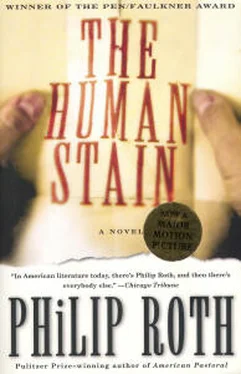“Coleman Silk never once deviated in any way from totally fair conduct in his dealings with each and every one of his students for as long as he served Athena College. Never”.
“The alleged misconduct never took place. Never”.
“What he was forced to undergo — the accusations, the interviews, the inquiry — remains a blight on the integrity of this institution to this day, and on this day, more than ever. Here, in the New England most identified, historically, with the American individualist's resistance to the coercions of a censorious community — Hawthorne, Melville, and Thoreau come to mind — an American individualist who did not think that the weightiest thing in life were the rules, an American individualist who refused to leave unexamined the orthodoxies of the customary and of the established truth, an American individualist who did not always live in compliance with majority standards of decorum and taste — an American individualist par excellence was once again so savagely traduced by friends and neighbors that he lived estranged from them until his death, robbed of his moral authority by their moral stupidity. Yes, it is we, the morally stupid censorious community, who have abased ourselves in having so shamefully besmirched Coleman Silk's good name. I speak particularly of those like myself, who knew from close contact the depth of his commitment to Athena and the purity of his dedication as an educator, and who, out of whatever deluded motive, betrayed him nonetheless. I say it again: we betrayed him. Betrayed Coleman and betrayed Iris”.
“Iris's death, the death of Iris Silk, coming in the midst of...”
Two seats to my left, Smoky Hollenbeck's wife was in tears, as were several other of the women nearby. Smoky was himself leaning forward, his forehead resting lightly on his two hands, which were entwined at the top of the pew in front of us in a vaguely ecclesiastical manner. I suppose he wanted me or his wife or whoever else might be watching him to believe that the injustice done to Coleman Silk was unendurable to think about. I supposed he was meant to appear to be overcome by compassion, yet knowing what I did about all that he concealed, as a model family man, of the Dionysian substrata of his life, it was an inference hard to swallow.
But, Smoky aside, the attention, the concentration, the acuity of the concentration focused on Herb Keble's every word seemed genuine enough for me to imagine that any number of people present would be finding it difficult not to lament what Coleman Silk had unfairly endured. I wondered, of course, if Keble's rationalization for why he hadn't stood beside Coleman at the time of the spooks incident was of his own devising or one that the Silk boys had come up with so as to enable him to do as they demanded while still saving face. I wondered whether the rationalization could be an accurate description of his motives when he'd said the words that Coleman bitterly repeated to me so many times: “I can't be with you on this.”
Why was I unwilling to believe this man? Because, by a certain age, one's mistrust is so exquisitely refined that one is unwilling to believe anybody? Surely, two years back, when he was silent and didn't rise to Coleman's defense, it was for the reason that people are always silent: because it is in their interest to be silent. Expediency is not a motive that is steeped in darkness. Herb Keble was just another one out trying to kosher the record, albeit in a bold, even an interesting way, by taking the guilt upon himself, but the fact remained that he couldn't act when it mattered, and so I thought, on Coleman's behalf, Fuck him.
When Keble came down from the podium and, before returning to his seat, stopped to shake the hands of each of Coleman's children, that simple gesture served only to intensify the almost violent passion aroused by his speech. What would happen next? For a moment there was nothing. Just the silence and the coffin and the emotional intoxication of the crowd. Then Lisa stood up, mounted the few steps to the podium, and, from the lectern, said, “The last movement of Mahler's Third Symphony.” That was it. They pulled out all the stops. They played Mahler.
Well, you can't listen to Mahler sometimes. When he picks you up to shake you, he doesn't stop. By the end of it, we were all crying.
Speaking only for myself, I don't think anything could have torn me apart like that other than hearing Steena Palsson's rendition of “The Man I Love” as she'd sung it from the foot of Coleman's Sullivan Street bed in 1948.
The three-block walk to the cemetery was memorable largely for its seemingly not having taken place. One moment we were immobilized by the infinite vulnerability of Mahler's adagio movement, by that simplicity that is not artifice, that is not a strategy, that unfolds, it almost seems, with the accumulated pace of life and with all of life's unwillingness to end ... one moment we were immobilized by that exquisite juxtaposition of grandeur and intimacy that begins in the quiet, singing, restrained intensity of the strings and then rises in surges through the massive false ending that leads to the true, the extended, the monumental ending ... one moment we were immobilized by the swelling, soaring, climaxing, and subsiding of an elegiac orgy that rolls on and on and on with a determined pace that never changes, giving way, then coming back like pain or longing that won't disappear ... one moment we were, at Mahler's mounting insistence, inside the coffin with Coleman, attuned to all the terror of endlessness and to the passionate desire to escape death, and then somehow or other sixty or seventy of us had got ourselves over to the cemetery to watch as he was buried, a simple enough ritual, as sensible a solution to the problem as any ever devised but one that is never entirely comprehensible. You have to see it to believe it each time.
I doubted that most people had been planning to accompany the body all the way to the grave. But the Silk children had a flair for drawing out and sustaining pathos, and this, I assumed, was why there were so many of us crowding around as close as we could to the hole that was to be Coleman's eternal home, as though eager almost to crawl in there and take his place, to offer ourselves up as surrogates, as substitutes, as sacrificial offerings, if that would magically allow for the resumption of the exemplary life that, by Herb Keble's own admission, had been as good as stolen from Coleman two years back.
Coleman was to be buried beside Iris. The dates on her headstone read 1932–1996. His would read 1926–1998. How direct those numbers are. And how little they connote of what went on.
I heard the Kaddish begin before I realized that somebody there was chanting it. Momentarily I imagined that it must be drifting in from another part of the cemetery, when it was coming from the other side of the grave, where Mark Silk — the youngest son, the angry son, the son who, like his twin sister, bore the strongest resemblance to his father — was standing alone, with the book in his hand and the yarmulke on his head, and chanting in a soft, tear-filled voice the familiar Hebrew prayer. Yisgadal, v'yiskadash...
Most people in America, including myself and probably Mark's siblings, don't know what these words mean, but nearly everyone recognizes the sobering message they bring: a Jew is dead. Another Jew is dead. As though death were not a consequence of life but a consequence of having been a Jew.
When Mark had finished, he shut the book and then, having induced a grim serenity in everyone else, was himself overcome by hysteria. That was how Coleman's funeral ended — with all of us immobilized this time by watching Mark go to pieces, helplessly flailing his arms in the air and, through a wide-open mouth, wailing away. That wild sound of lamentation, older even than the prayer he'd uttered, rose in intensity until, when he saw his sister rushing toward him with arms outstretched, he turned to her his contorted Silk face, and in sheer childlike astonishment cried, “We're never going to see him again!”
Читать дальше












